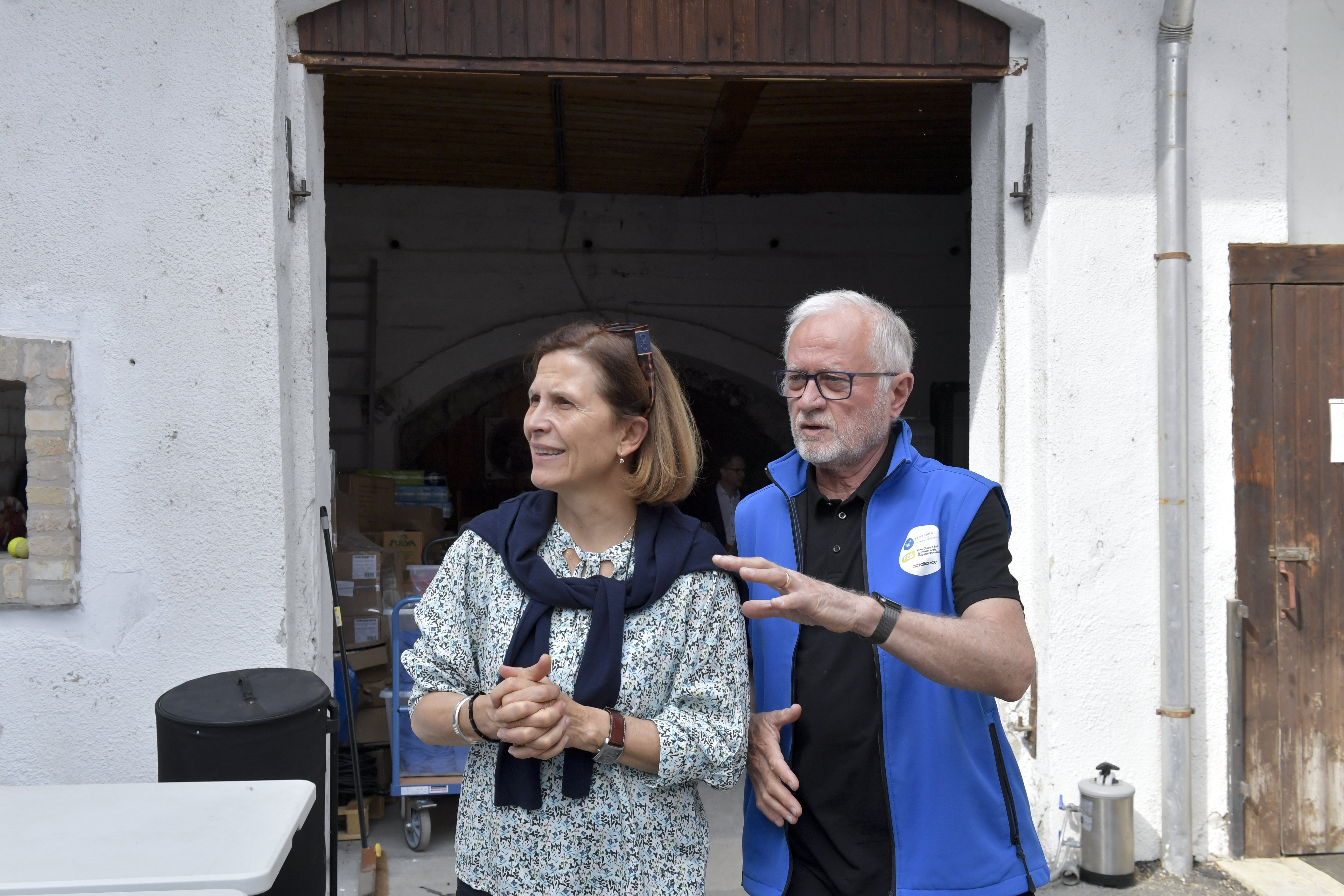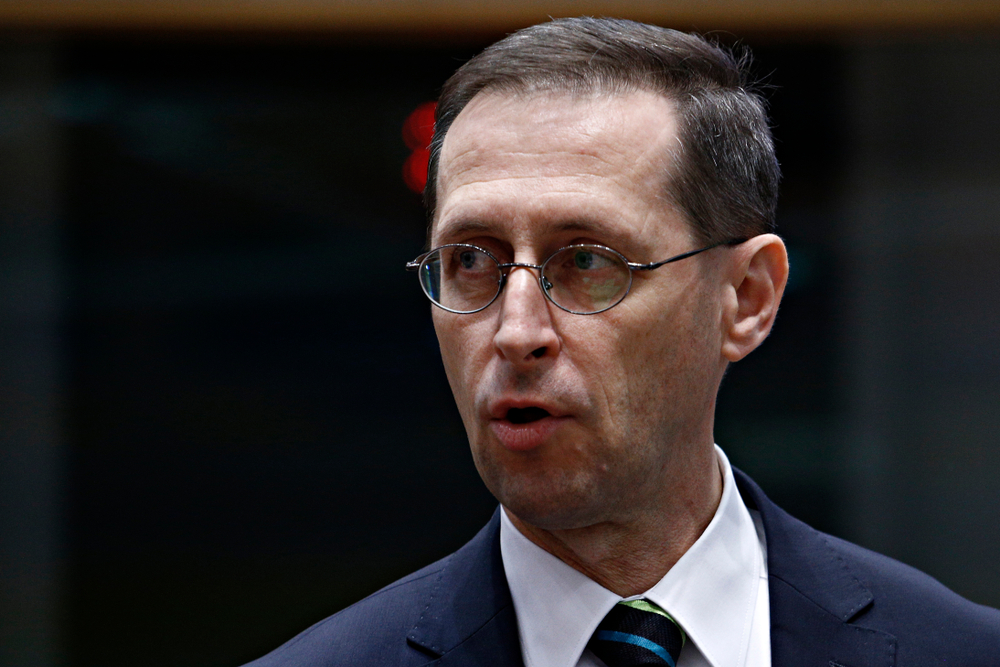Hungary, EC at Odds Over Russian oil Embargo

Anikó Lévai, wife of Prime Minister Viktor Orbán and Goodwill Ambassador of the Ecumenical Relief Organization, and László Lehel, president and CEO of the Ecumenical Relief Organization, at the Ecumenical Relief Organization’s National Center in Budapest on May 13. The World Relief Organisation and church aid organization Finn Church Aid signed a cooperation agreement at the National Center, attended by Anikó Lévai.
Photo by Silárd Kosticsák / MTI
European Commission President Ursula von der Leyen told the European Parliament on May 4 that it would institute a “complete import ban on all Russian oil, seaborne and pipeline, crude and refined.” That would involve a phase-out of Russian crude “within six months” and refined products by the end of the year and was a consequence of Russia’s invasion of Ukraine and the resulting energy security implications, she said.
The proposal was rejected out of hand by the Hungarian government’s international spokesman Zoltán Kovács on the BBC and Minister of Foreign Affairs and Trade Péter Szijjártó on his Facebook page. After consultation with industry leaders, cabinet members, and top advisors, Prime Minister Viktor Orbán agreed on May 6 that the proposed embargo was unacceptable, calling it the “equivalent of dropping a nuclear bomb on the Hungarian economy.”
In addition to speaking with French President Emmanuel Macron (the current holder of the rotating presidency of the Council of the European Union) about the proposed embargo, Orbán hosted von der Leyen for a working dinner at his office in Budapest’s Castle District on May 9, “to clarify issues related to sanctions and energy security,” von der Leyen tweeted afterward.
Szijjártó, who was also in attendance at the meeting, said that “some progress” had been made, relating that von der Leyen had been informed “in detail” of the problems that the proposed sanctions would cause Hungary. “We asked for these problems to be weighed,” he added.
Szijjártó later said, on May 11, that Hungary would push for an exemption of pipeline deliveries from the embargo, noting that a large part of Russian oil is delivered to Europe via tanker. Since landlocked Hungary receives most of its oil via pipeline from Russia, and its main MOL-owned refinery is technically reliant on Russian crude, switching to new sources would require hundreds of millions of euros, while motor fuel prices would spike 55-60%, Szijjártó claimed in a post on his Facebook page.
Assistance Package
Meanwhile, Szijjártó outlined a EUR 37 million assistance package Hungary is offering Ukraine at a conference in Warsaw on May 5. In addition to the construction of a school and a hospital in or near Kyiv, the five-part package will include mobile homes delivered to the west of Ukraine for internally displaced refugees, scholarships to Ukrainian students who wish to continue their university studies in Hungary, treating wounded Ukrainian soldiers in Hungarian hospitals, and providing for the care of 130 children in hospitals.
According to a representative study by the Kopp Mária Institute for Population and Families, one in three Hungarians have assisted refugees from Ukraine, some 58% of whom provided donations, 40% food, and 39% other donations. Nearly one-fifth of the respondents who provided assistance also volunteered to help the refugees.
Additionally, Japan’s Suzuki group donated EUR 1 million in cash to support refugees from Ukraine through the United Nations High Commissioner for Refugees, according to an announcement from Magyar Suzuki. The local unit is distributing EUR 150,000 of the amount and will donate EUR 60,000 to UNICEF Hungary, EUR 50,000 to the Hungarian Red Cross, and EUR 40,000 to the Hungarian Charity Service of the Order of Malta. Magyar Suzuki earlier offered six Suzuki Vitara SUVs to charity organizations bringing aid to refugees along Hungary’s border with Ukraine.
Minister of Finance Mihály Varga also said that Hungary would share some of the EUR 2 billion in resources the European Bank for Reconstruction and Development is making available to ease the impact of the war in Ukraine on neighboring countries, following a meeting with EBRD President Odile Renaud-Basso in Marrakesh on May 10. Varga added that Hungary would be prepared to cooperate with the bank in its participation in the post-war reconstruction of Ukraine.
This article was first published in the Budapest Business Journal print issue of May 20, 2022.
SUPPORT THE BUDAPEST BUSINESS JOURNAL
Producing journalism that is worthy of the name is a costly business. For 27 years, the publishers, editors and reporters of the Budapest Business Journal have striven to bring you business news that works, information that you can trust, that is factual, accurate and presented without fear or favor.
Newspaper organizations across the globe have struggled to find a business model that allows them to continue to excel, without compromising their ability to perform. Most recently, some have experimented with the idea of involving their most important stakeholders, their readers.
We would like to offer that same opportunity to our readers. We would like to invite you to help us deliver the quality business journalism you require. Hit our Support the BBJ button and you can choose the how much and how often you send us your contributions.









